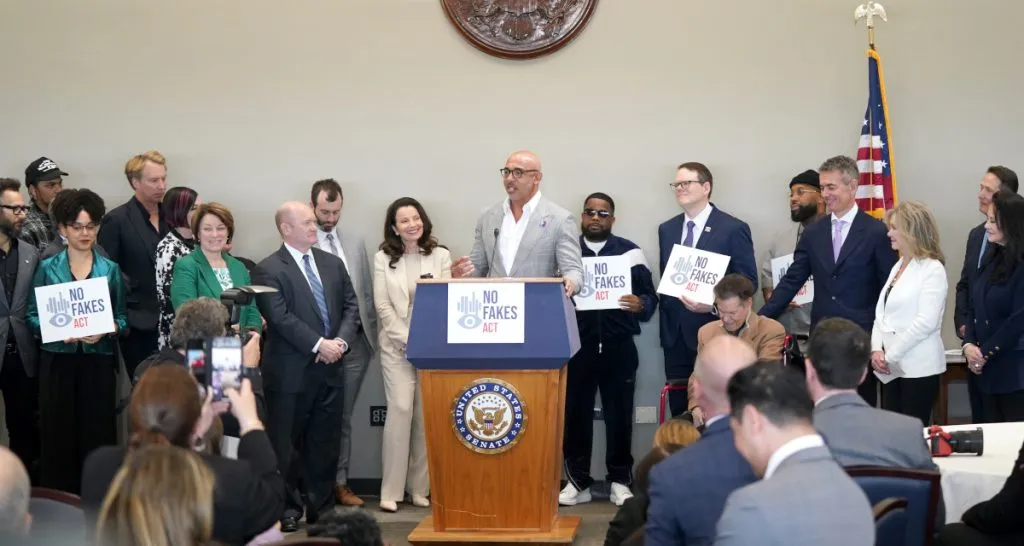Recording Academy CEO Harvey Mason Jr. speaks during Grammys on the Hill in support of the expanded No Fakes Act. Photo Credit: The Recording Academy
Federal lawmakers have reintroduced the No Fakes Act, which is drawing strong support from in and well beyond the music industry.
Senators and representatives from both sides of the aisle reintroduced the legislation today. We’ve covered the years-old bill (which, looking to tackle AI deepfakes, would establish bolstered voice and likeness protections) from the outset.
In April 2024, for instance, Warner Music CEO Robert Kyncl appeared before Congress to back (among different measures) the No Fakes Act, which received legislative pushes in July and September of the same year.
Of course, those particular pushes didn’t lead to passage. But much has changed – in the AI world and elsewhere – since then. Like during the summer of 2024, DMN’s inbox is currently filled with statements touting the No Fakes Act.
However, in addition to enthusiastic remarks from the Recording Academy, the RIAA, the NMPA, ASCAP, the NAB, the major labels (Kyncl and Randy Travis were on Capitol Hill for the bill’s reintroduction), A2IM, and several others, support is now coming from outside the industry as well.
OpenAI has endorsed the revamped No Fakes Act, YouTube signed off on the bill in a blog post, and the Walt Disney Company applauded the “important and meaningful protections” at hand, to name a portion of the examples.
It probably goes without saying, but this newfound unity resulted from months of back and forth on the No Fakes Act, the latest iteration of which is 40% longer than the original by page count.
Just scratching the surface here, the bill contains updated liability exclusions, including for any “service by wire or radio that provides the capability to transmit data” and any “online service” provider for which it’s “not technologically feasible” to remove “offending material.”
Meanwhile, the heftier legislation dives into a variety of penalties, for both online service providers and individuals, pertaining to alleged deepfake violations. And perhaps most notably, the No Fakes Act would enable litigating rightsholders to ask any district court clerk “to issue a subpoena to a provider of an online service for identification of an alleged violator” of the law.
For obvious reasons, that rightsholder-tech compromise could spell trouble for those who’ve uploaded soundalike AI works without permission.
Here are a few of the many music industry statements backing the new version of the No Fakes Act.
Recording Academy CEO Harvey Mason Jr.: “The Academy is proud to represent and serve creators, and for decades, GRAMMYs on the Hill has brought music makers to our nation’s capital to elevate the policy issues affecting our industry. Today’s reintroduction of the NO FAKES Act underscores our members’ commitment to advocating for the music community, and as we enter a new era of technology, we must create guardrails around AI and ensure it enhances – not replaces – human creativity.
We thank Senators Blackburn and Coons, and Representatives Dean and Salazar for their unwavering support on this issue, and we look forward to working alongside them to pass the NO FAKES Act this Congress.”
Warner Music Group CEO Robert Kyncl: “I applaud Senators Blackburn and Coons and Representatives Salazar and Dean for their leadership in introducing the NO FAKES Act. This bill reflects what can happen when tech and creative industries come together – foster cutting edge innovation while protecting human identity and artistry. We look forward to working with key members of the US Senate and House to help pass the NO FAKES Act this year.”
NMPA president and CEO David Israelite: “NMPA is proud to support the reintroduction of the No Fakes Act. In an era where artificial intelligence is rapidly reshaping the creative landscape, it is critical that we protect the rights of creators from exploitation, fraud, and misuse. We commend Senators Coons, Blackburn, Klobuchar, and Tillis for their leadership in protecting songwriters and artists from illicit theft of their work. By establishing new protections against the harmful use of digital replicas, the No Fakes Act will provide the necessary framework to ensure that AI serves as a tool to enhance creativity rather than undermine the rights of those who create it. We urge the Senate to move swiftly in passing this critical legislation and securing the protections the creative community deserves.”
Content shared from www.digitalmusicnews.com.

